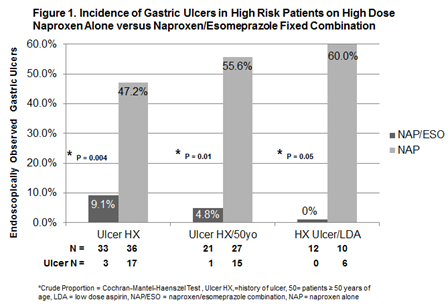Session Information
Session Type: ACR Poster Session B
Session Time: 9:00AM-11:00AM
Background/Purpose: Patients ≥65 taking naproxen with
previous GI symptoms have a 29% annual incidence of significant upper
gastrointestinal events.(1) Those patients who are older, with previous ulcer
history, and on low dose aspirin (LDA) are particularly at risk for gastric
ulcers. Prophylaxis with gastroprotective agents can help reduce adverse GI
effects. Here we report the comparative incidence of gastric ulcers (GUs) with
a fixed combination of naproxen 500 mg/ esomeprazole 20 mg (NAP/ESO) versus
naproxen 500mg (NAP) alone given twice daily to patients with a previous
history of ulcers who required continued NSAID therapy.
Methods: We pooled data from two large randomized, placebo
controlled trials (n=854) which reported a significant reduction in the
incidence of cumulative GUs over 6 months with NAP/ESO (n=428) compared with
NAP (n=426). (2) Efficacy in a subset with 1) a history of GU within 5 years, 2)
aged ≥ 50 + history of GU, and 3) use of aspirin + history of GU were
assessed. The CMH test was used to compare the treatment groups for differences
at the 0.05 level. Relative Risk Reduction (RRR) and number-needed-to-treat
(NNT) were calculated.
Results: In total, 69 patients (N=33, NAP/ESO, N=36, NAP) had
a history of GUs (Figure 1). NAP/ESO use was found to statistically significantly
reduce the risk for GUs over 6 months as compared with NAP alone in those 1) with
a history of GU [RRR=0.81, NNT= 2.62], 2) aged ≥ 50 + history of GU [RRR=0.91,
NNT=1.97]and 3) use of aspirin + a history of GUs [RRR=1, NNT=1.67].
Conclusion: The fixed combination of NAP/ESO significantly
reduces the risk for gastric ulcers associated with high dose naproxen in those
at high inherent risk. Numbers of patients needed to be treated to prevent one
event were low (< 3).
References:
(1) van
Tuyl, et al. BMC Musculoskeletal Disorders 2014;15:28-33.
(2) Goldstein,
et al. Aliment Pharmacol Ther 2010; 32: 401–413
To cite this abstract in AMA style:
Fort J, Holt RJ, Kent JD, Bello A. Reducing Gastric Ulcers in Patients with a History of Gastrointestinal (GI) Ulcers Who Require Long-Term High-Dose Non-Steroidal Anti-Inflammatory Drug (NSAID) Therapy [abstract]. Arthritis Rheumatol. 2015; 67 (suppl 10). https://acrabstracts.org/abstract/reducing-gastric-ulcers-in-patients-with-a-history-of-gastrointestinal-gi-ulcers-who-require-long-term-high-dose-non-steroidal-anti-inflammatory-drug-nsaid-therapy/. Accessed .« Back to 2015 ACR/ARHP Annual Meeting
ACR Meeting Abstracts - https://acrabstracts.org/abstract/reducing-gastric-ulcers-in-patients-with-a-history-of-gastrointestinal-gi-ulcers-who-require-long-term-high-dose-non-steroidal-anti-inflammatory-drug-nsaid-therapy/

